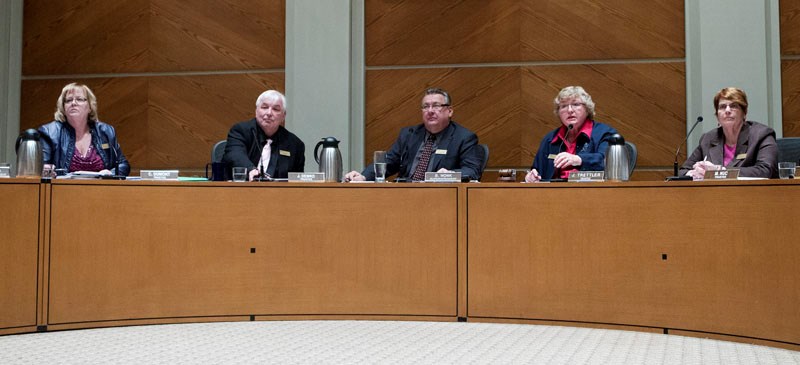St. Albert Public may soon be the second district in the province to have a policy that protects gay, lesbian and transgendered youth thanks to a split vote this week.
St. Albert Public may soon be the second district in the province to have a policy that protects gay, lesbian and transgendered youth thanks to a split vote this week.
Public school board trustees voted 3-2 in favour of drafting a standalone sexual orientation and gender identity policy Wednesday. Trustee Gerry Martins and board chair Joan Trettler were opposed.
The policy, when written, will deal with bullying and discrimination against lesbian, gay, bisexual and transgender staff and students. Edmonton Public is currently the only district in the province with such a policy.
The board already includes protection for sexual orientation and gender identity in its student conduct code, and is now considering it in its discrimination and harassment policy as well.
Trustee Cheryl Dumont made the initial motion.
Youths are 1.5 to seven times more likely to commit suicide if they are of a sexual minority than if they are not, Dumont said, citing stats from the U.S. Suicide Prevention Resource Centre, and have needs that are seldom addressed by general-purpose anti-bullying policies.
"We all care for all of our kids, but sometimes we have to stand up for the most vulnerable among them," she said. "More needs to be done to protect our sexual-minority youths from potential harm and help them preserve their identity."
Thorough debate
About 15 people turned out to watch the debate – far more than the two or three who usually come to board meetings.
James Ravenscroft, the minister of St. Albert's United Church, said in an interview that he would have come out as gay five years earlier if his school had had such a policy. "I spent a miserable, miserable high-school life pretending to be somebody I wasn't."
Generic anti-bullying policies don't help, he told the board. Bullying supposedly wasn't tolerated when he was in school, Ravenscroft told the board, but teachers turned a deaf ear to homophobic slurs.
"It was pretty much okay to call anyone 'fag' or 'sissy,' " he said – even the teachers did it. "It was hurtful, but no one seemed to care." That created a climate of fear and isolation, one where he felt compelled to bully other sexual minority students to hide his own identity.
An explicit policy will create an expectation among staff and students that this kind of bullying will not be tolerated, Ravenscroft said.
"Jesus taught us to love our neighbour," he said. "How can I say I really love my neighbour if I stand by and allow others to not be safe?"
Martins spoke against Dumont's motion. "This board will not tolerate discrimination" on any grounds, he said, and it was already revising its discrimination and harassment policies to forbid discrimination against sexual minorities.
"All individuals, repeat, all individuals are equally important," he said, regardless of their ethnic, religious, or gender identity backgrounds. "None of these groups are more important than the others," he said, forcefully. "They're equal."
At this point, Carol Allen, a retired transgendered teacher from Edmonton who said she faced ridicule and discrimination from administrators due to her gender identity, stormed out of the meeting, saying, "I can't listen to this."
Catholic board superintendent David Keohane, who was not at the meeting, echoed Martins' position in an interview.
"We need to be very careful that we understand the needs of all students," he said. A standalone policy for sexual minorities was segregationist, he said, and would create a need for policies for other minority groups. He favoured a broader approach that treated all kinds of bullying the same.
A standalone policy would in fact be inclusive, said trustee Joe Demko, as it would protect everyone from discrimination based on sexual orientation – including heterosexuals.
A 2011 study of 3,700 Canadian students by the University of Winnipeg found that about 70 per cent of students heard homophobic language at school every day, Demko noted, with 10 per cent of sexual minority students hearing it from teachers daily or weekly. The study also found that about 58 per cent of non-sexual minority students found homophobic language upsetting.
The study found that sexual minority students were more likely to be physically and verbally abused than non-minorities, Demko said, and that about 64 per cent of sexual minority students felt unsafe at school, compared to just 15 per cent of non-minorities.
Trustee Merrin Nuc said she initially opposed a standalone approach until she heard that a student panel felt that one could help. "I'm not sure it would make much of a difference … but if two students in this group really feel it will make a difference, so be it."
There's a clear need to be proactive here, Trettler said, but she questioned whether a standalone policy was needed given recent and pending revisions to the board's student conduct and discrimination and harassment policies.
The board would review a draft of the new policy later this year, Trettler said.
